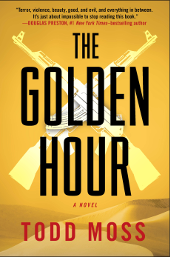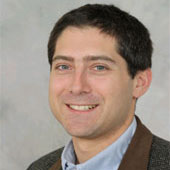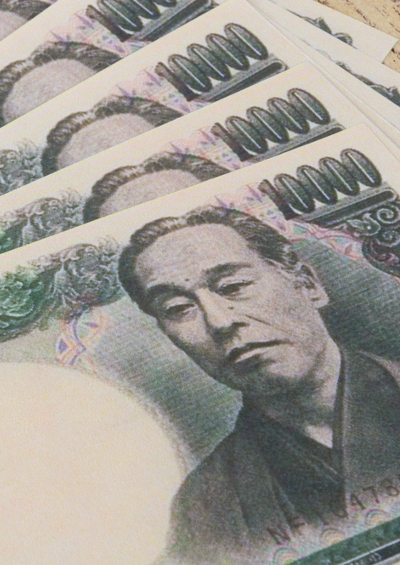A Professor in Foggy Bottom: “The Golden Hour”
An international thriller set in the world of politics and espionage.
November 1, 2014

Data are increasingly dominating political science. In the real world of policymaking, however, hard numbers are much rarer. In the novel “The Golden Hour,” the main character, Amherst College Professor Judd Ryker, has been invited to present his research on crisis data at the U.S. State Department. Little does he know, the Secretary’s Chief of Staff is launching a new rapid response unit — and Ryker is unwittingly interviewing for the job.
U.S. Department of State, 9:15am
The brightly lit conference room had dark cherrywood paneling with a bank of six large flat-panel monitors along one wall. Just like in the movies, he thought to himself.
About a dozen men and women, all in dark suits, were sitting in high-backed leather chairs around the table. Behind them, in a concentric ring, sat younger suits. They read papers or thumbed dials on their mobile phones. They look like my students.
At exactly nine fifteen, a tall man walked in briskly from a side door. He was in his late thirties and had small round glasses and short-cropped hair. Immediately, the room went silent and the man nodded to no one in general, and then approached Judd.
“Ryker, I’m Landon Parker. Thanks for coming in. We’ve got no more than ten minutes, so I’ll spare introductions. You’ve got the Secretary’s planning staff here, plus the heads of each of the major regional and functional offices.”
Parker turned to the others. “Folks, this is Professor Judd Ryker from Amherst College.”
Back to Judd. “Okay, Ryker. The floor is yours.”
“I’ll try to make this quick. Thank you, Mr. Parker, for asking me to come here today.” Judd stood up for emphasis. “In emergency medicine, a trauma patient’s chances of survival are greatest if they receive professional care in the hospital within sixty minutes after a severe multisystem injury. This is known as the Golden Hour.”
Judd scanned the room, hoping for hints of recognition. Nothing. He continued, “Although there is some debate about the precise length of time of the Golden Hour, the principle of rapid intervention in trauma cases is universally accepted. If you don’t get help very quickly, you die. It’s that simple.” Judd nodded, but still no reaction from the audience.
“I believe we have found the same principle to apply to international political trauma. We can’t run experiments in a lab, but we can pick up patterns in the data. The numbers can tell us.” Pause. In the classroom, my undergrads always love that line, he thought.
Judd waved his arms as he got more excited. “Using data over the past forty years, we studied 230 cases of political crisis in low- and middle-income countries. We found that the probability of resolution declines significantly over time. In fact, time is more dominant in the statistical analysis than ethnic cleavages, type of regime, or the other standard political variables.”
Judd waited a moment, to give the crowd time to let that settle in. Again, no reaction. Am I losing them? he wondered.
“Most interesting, the time-resolution correlation is not linear. In plain English, this means we have found clear tipping points in time. For the outbreak of a civil war, the critical period is about thirteen or fourteen days. After two weeks, the chances of a speedy resolution decline by more than half. Similarly, if an illegal seizure of power by the military is not reversed within about four days, the chances of reversal over the next year drop by eighty percent.”
Judd paused for effect. “In other words, ladies and gentlemen, the Golden Hour for a coup d’état is just 100 hours.”
Satisfyingly, this finally led to murmuring and scribbling among the crowd.
“I must stress that these results are still preliminary, and I have teams in Asia and Africa collecting additional data.” Caveats. I have a reputation to protect.
At long last, questions trickled in. “Are you finding differences across regions? Is Africa different from south Asia, or are they all pretty much the same?” asked one of those seated at the table, without identifying himself.
“No, we haven’t found any of the regional variables to be statistically significant,” responded Judd.
“Did anything change with the end of the Cold War or 9/11?”
“Good question. We haven’t broken the data into periods. We could try that. I just don’t know.”
“What is driving the results on coups? How can you explain what’s so special about timing? I understand the idea of a Golden Hour, but why does it exist?”
“We don’t really know. We can theorize that it probably has something to do with the dynamics of consolidating power after seizure. The coup makers must line up the rest of the security forces and maybe buy off parliament and other local political leaders before those loyal to the deposed president are able to react and countermove. It’s a race for influence. But these are just hypotheses.”
“What about international intervention? Does it matter if an external force gets involved diplomatically?” asked one staffer.
“Or militarily?” interjected another.
“We don’t have classifications for intervention, so it’s not in there,” replied Judd. “The numbers can’t tell us. So, we don’t know. I guess we could —”
Parker interrupted abruptly. “But in your expert opinion, Ryker, does it matter? Would it make a difference? Does the United States need to find ways to intervene more rapidly in emerging crises in the developing world? Can we prevent more wars and coups by reacting more quickly?”
Judd looked around the room at all the eyes locked on him. My numbers don’t answer that question. Isn’t that what you guys are here for?
But instead he sat up straight, turned to look Landon Parker directly in the eyes, and said simply, “Yes.”
Editor’s note: The above text is adapted from “The Golden Hour,” by Todd Moss by arrangement with G. P. Putnam’s Sons, a member of Penguin Group (USA) LLC, Copyright © 2014 by Todd Moss.
Takeaways
Data are increasingly dominating political science, but in the real world of policymaking, hard numbers are far rarer.
Time is more dominant in the statistical analysis than ethnic cleavages, type of regime, or the other standard political variables.
“In other words, ladies and gentlemen, the Golden Hour for a coup d’état is just one hundred hours.”

